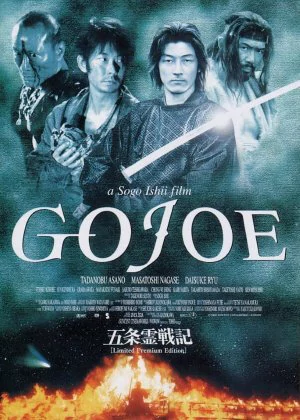Gojoe
Sogo/Gakuryu Ishii is no doubt one of the most underrated Japanese directors out there. His spotlight stolen by Shinya Tsukamoto, Ishii has been happily plowing away in the shadows since he started out more than 40 years ago. Gojoe [Gojo Reisenki: Gojoe] is one of his most commercial projects, though with directors like Ishii that's all relative. It was one of the first Ishii films I watched, back when I just was getting into Japanese cinema. I liked it quite a bit, but I wasn't entirely sure how and if it would hold up after so many years. Turns out it hasn't lost much of its original appeal.
![screen capture of Gojoe [Gojo Reisenki: Gojoe]](/thumbs/img/articles/1200xauto/gojoe-1.webp)
Gojoe was a rather sizeable commercial flop, so much in fact that it was partly responsible for bankrupting the studio that financed it. That's not a good look, but there are basically two kinds of commercial failures. The first is where a studio explicitly tries to make a big blockbuster and bombs, the other is where an indie director is given a big, lump sum of money to make the film he wants (and ends up failing commercially). Gojoe is the latter, and while it won't make much of a difference to the studio, it's a rare breed of film that should be treasured by film fans, as these type of projects don't come by very often.
With Gojoe, Ishii takes on the jidaigeki (read: samurai) genre. It's a rather traditional Japanese niche that never really evolved beyond the film language that was established in the 50s and 60s, by directors like Kobayashi and Kurosawa. Enter Ishii, a man known for his kinetic visual style, excessive and loud soundtracks and punk mentality. If you look at it logically and factually, it was a disaster waiting to happen. But it was also a much-needed breath of fresh air that landed the genre a little kick in the groin and challenged its existing boundaries.
The plot of the film revolves around a demon terrorizing the Gojoe bridge, killing all Heike warriors that try to cross it. The Heike are the dominant clan in the area and are worried these thrashings are damaging their reputation. They've hired several warriors and gangs already, but none of them were up to the challenge. Their luck seems to change when Benkei, a repenting monk, arrives at the bridge hoping to face the demon. Benkei wasn't hired by the Heike clan though, which puts them in a tough spot. But as it stands, he looks like the only one able to face up to the demon.
![screen capture of Gojoe [Gojo Reisenki: Gojoe]](/thumbs/img/articles/1200xauto/gojoe-2.webp)
Don't expect a full-on, punk-inspired assault on the senses. Sure enough, the camera work, especially during the action scenes, is a lot more energetic compared to other jidaigeki films. The visuals in general don't feel quite as solemn and static as Ishii doesn't belie his signature style, but it is clearly toned down and more retrained, starting off quite moderate and building up to a finale where Ishii finally puts all his cards on the table. People hoping for a more traditional film will be sorely disappointed by this direction, but it's what makes Gojoe stand out.
The soundtrack too is a very clever compromise. No screaming guitars, grunting artists, straining speakers and distorted sounds, but more traditional-sounding drum-based music that offers strong rhythmic direction without overtly clashing with the setting. It's ideal for ramping up the energy during the action scenes, while also perfect for building up tension in between. It's not a very memorable or distinctive soundtrack, certainly not when comparing it to other Ishii films, but it does a fine job of modernizing the genre without completely overturning its conventions.
The cast isn't too shabby either. With headliners like Tadanobu Asano, Masatoshi Nagase, Jun Kunimura and Ittoku Kishibe there's plenty of talent here that knows exactly how to draw the most from their characters. It's a bit disappointing that the lead was given to Daisuke Ryû, not the best actor of the bunch, but he mostly just falters in comparison with the ones surrounding him. There's a rather large cast of secondary actors too, but most of them are just sword fodder and/or background padding, with little in the way of actual dialogue.
![screen capture of Gojoe [Gojo Reisenki: Gojoe]](/thumbs/img/articles/1200xauto/gojoe-3.webp)
Ishii takes his time with Gojoe. The first part of the film is dedicated to introducing the different characters and setting up the mystery. It's the middle part that maybe could've used a little trimming. While there's some enjoyable back and forth between Benkei, the Heike and the demons, it doesn't really advance the film all that much. It's just stalling for the inevitable showdown. Fifteen minutes shorter would've been perfect I think, but once Ishii starts building up to the finale that minor slump is quickly forgotten. As for the finale itself, expect some vintage Ishii craziness.
Gojoe is a film that was bound to fail. Not punk enough for the true Ishii zealot, too kinetic for the classic jidaigeki fan and a bit long for casual watchers. Leave all those preconceptions behind though and what remains is a very entertaining film that rejuvenated the jidaigeki genre, while proving Ishii is more than just an underground niche director. Gojoe is an energetic film, built on intriguing lore, sporting a stellar cast and delivering one of the most explosive finales in the genre. A true Ishii blockbuster film. The neat thing is that it hasn't lost much of its appeal since its original release, so hopefully the film can still redeem itself in the decades to come.
